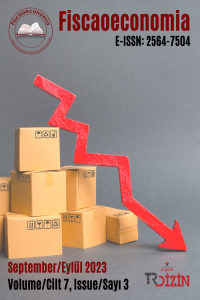Öz
One noteworthy aspect of the theoretical debates between Proudhon and Marx, which is of historical significance in terms of highlighting the relationship between anarchism and Marxism, is their differing views on property. In the discussion of the origin and development of property, Proudhon characterizes property as theft, while Marx argues that property can only be evaluated within the framework of the social production relations of the relevant period. Proudhon’s aim is to analyze the forms of usurpation by revealing the impossibility of property. In Proudhon, who deals with this through the right to abuse, property is conceived as a legal concept and approaches that construct property as a "natural right" are criticized. Pointing out that Proudhon perceives property as a legal will, Marx emphasizes that he reduces all economic relations to property as a general concept of law, and he thinks that Proudhon’s critique of property does not go beyond Brissot’s motto “property is theft” used much earlier. The basis that Marx provides for this idea is that Proudhon’s economic-political critique was also based on the assumptions of the precursors of economic-political. In this study, the property-centered divergence between Proudhon and Marx is revealed through how the assumptions of a real critique of political economy are positioned in the critique of Proudhon.
Anahtar Kelimeler
Kaynakça
- Corcuff, P. (2002). Bireycilik Sorunu. A. U. Kılıç (Çev.). İstanbul: Versus Yayıncılık.
- Crowder, G. (1999). Klasik Anarşizm. S. Altıparmak (Çev.). İstanbul: Öteki Yayınevi.
- Ege, R. (2019). Proudhon ile Marx: Bir Siyasal Hayal-Kırıklığının Öyküsü. Yıldız Social Science Review, 5(2), 103-115.
- Haubtmann, P. (1982). Pierre- Joseph Proudhon: Sa vie et sa pensée (1809-1849). Beauchense Editeur.
- Marx, K. (1966). Felsefenin Sefaleti. E. Başar (Çev.). Ankara: Sol Yayınları.
- Marx, K. & Engels, F. (1975). Collected Works: Volume II. New York and Londra: International Publishers.
- Marx, K. & Engels, F. (1976a). Kutsal Aile K. Somer (Çev.). Ankara: Sol Yayınları.
- Marx, K. & Engels, F. (1976b). 1844 El Yazmaları. K. Somer (Çev.). Ankara: Sol Yayınları.
- Marx, K. & Engels, F. (1989). Collected Works: Volume XXIV. New York and Londra: International Publishers.
- Marx, K. (2013). Grundrisse I. A. Gelen (Çev.). Ankara: Sol Yayınları.
- Mcnally, D. (2013). Felsefenin Sefaleti. Marxist Klasikleri Okuma Kılavuzu (77-93). İstanbul: Yordam Yayıncılık.
- Proudhon, J. (1953). Mutuellisme et Fédéralisme. Paris: Librairie Dalloz.
- Proudhon, J. (1997). Théorie de la Propriété. Montréal and Paris: Editions L’Harmanttan.
- Proudhon, J. (2010). Mülkiyet Nedir?. D. Çetinkasap (Çev.). İstanbul: İş Bankası Yayınları.
- Proudhon, J. (2012). İktisadi Çelişkiler Sistemi ya da Sefaletin Felsefesi. I. Ergüden (Çev.). İstanbul: Kaos Yayıncılık.
- Proudhon, J. (2014). Federasyon İlkesi. M. Özaslan (Çev.). İstanbul: Öteki Yayınevi.
- Thomas, P. (2000). Marx ve Anarşistler. D. Evci (Çev.). Ankara: Ütopya Yayıncılık.
- Woodcock, G. (2014). Anarşizm: Bir Düşünce ve Hareketin Tarihi. A. Türker (Çev.). İstanbul: Kaos Yayıncılık.
Öz
Anarşizm-Marksizm ilişkisini tarihsel olarak ortaya koyması bakımından kritik önemdeki Proudhon ile Marx arasındaki kuramsal tartışmaların dikkate değer bir boyutunu mülkiyet hakkındaki tezler oluşturmaktadır. Mülkiyetin kökeni ve gelişimine dair tartışmada Proudhon, mülkiyeti hırsızlık olarak nitelendirirken, Marx, mülkiyetin ancak ilgili dönemin toplumsal üretim ilişkileri çerçevesinde değerlendirebileceğini ortaya koymaktadır. Proudhon’un amacı, mülkiyetin olanaksızlığını açığa çıkararak, gasp edilme biçimlerini çözümlemektir. Bunu kötüye kullanma hakkı üzerinden ele alan Proudhon’da mülkiyet hukuki bir tasavvur olarak kavranarak, onu “doğal hak” şeklinde inşa eden yaklaşımlar eleştiriye tabi tutulur. Marx, tam da Proudhon’un mülkiyeti hukuki bir istenç şeklinde çözümlemesi nedeniyle ekonomik ilişkilerin bütününü genel hukuki tasavvur olarak mülkiyete indirgediğine dikkate çekerek, onun Brissot’un çok daha öncesinde kullandığı “mülkiyet hırsızlıktır” mottosundan öteye geçemediğini düşünür. Marx’ın bu düşüncesinde kendisine sağladığı dayanak, Proudhon’un ekonomi-politik eleştirisini, yine ekonomi-politiğin öncülleriyle yapmış olmasıdır. Bu çalışmada Proudhon ile Marx arasındaki mülkiyet merkezli ayrışma, ekonomi-politiğin gerçek bir eleştirisinin varsayımlarının Marx’ın Proudhon eleştirisinde nasıl konumlandığı üzerinden ortaya konulmaktadır.
Anahtar Kelimeler
Teşekkür
Böylesi saygın bir dergide emeği geçen herkese şükranlarımı sunarım..
Kaynakça
- Corcuff, P. (2002). Bireycilik Sorunu. A. U. Kılıç (Çev.). İstanbul: Versus Yayıncılık.
- Crowder, G. (1999). Klasik Anarşizm. S. Altıparmak (Çev.). İstanbul: Öteki Yayınevi.
- Ege, R. (2019). Proudhon ile Marx: Bir Siyasal Hayal-Kırıklığının Öyküsü. Yıldız Social Science Review, 5(2), 103-115.
- Haubtmann, P. (1982). Pierre- Joseph Proudhon: Sa vie et sa pensée (1809-1849). Beauchense Editeur.
- Marx, K. (1966). Felsefenin Sefaleti. E. Başar (Çev.). Ankara: Sol Yayınları.
- Marx, K. & Engels, F. (1975). Collected Works: Volume II. New York and Londra: International Publishers.
- Marx, K. & Engels, F. (1976a). Kutsal Aile K. Somer (Çev.). Ankara: Sol Yayınları.
- Marx, K. & Engels, F. (1976b). 1844 El Yazmaları. K. Somer (Çev.). Ankara: Sol Yayınları.
- Marx, K. & Engels, F. (1989). Collected Works: Volume XXIV. New York and Londra: International Publishers.
- Marx, K. (2013). Grundrisse I. A. Gelen (Çev.). Ankara: Sol Yayınları.
- Mcnally, D. (2013). Felsefenin Sefaleti. Marxist Klasikleri Okuma Kılavuzu (77-93). İstanbul: Yordam Yayıncılık.
- Proudhon, J. (1953). Mutuellisme et Fédéralisme. Paris: Librairie Dalloz.
- Proudhon, J. (1997). Théorie de la Propriété. Montréal and Paris: Editions L’Harmanttan.
- Proudhon, J. (2010). Mülkiyet Nedir?. D. Çetinkasap (Çev.). İstanbul: İş Bankası Yayınları.
- Proudhon, J. (2012). İktisadi Çelişkiler Sistemi ya da Sefaletin Felsefesi. I. Ergüden (Çev.). İstanbul: Kaos Yayıncılık.
- Proudhon, J. (2014). Federasyon İlkesi. M. Özaslan (Çev.). İstanbul: Öteki Yayınevi.
- Thomas, P. (2000). Marx ve Anarşistler. D. Evci (Çev.). Ankara: Ütopya Yayıncılık.
- Woodcock, G. (2014). Anarşizm: Bir Düşünce ve Hareketin Tarihi. A. Türker (Çev.). İstanbul: Kaos Yayıncılık.
Ayrıntılar
| Birincil Dil | Türkçe |
|---|---|
| Konular | Ekonomi Politik Teorisi |
| Bölüm | Makaleler |
| Yazarlar | |
| Yayımlanma Tarihi | 18 Eylül 2023 |
| Yayımlandığı Sayı | Yıl 2023 Cilt: 7 Sayı: 3 |
Fiscaoeconomia is licensed under a Creative Commons Attribution-NonCommercial-ShareAlike 4.0 International License.


